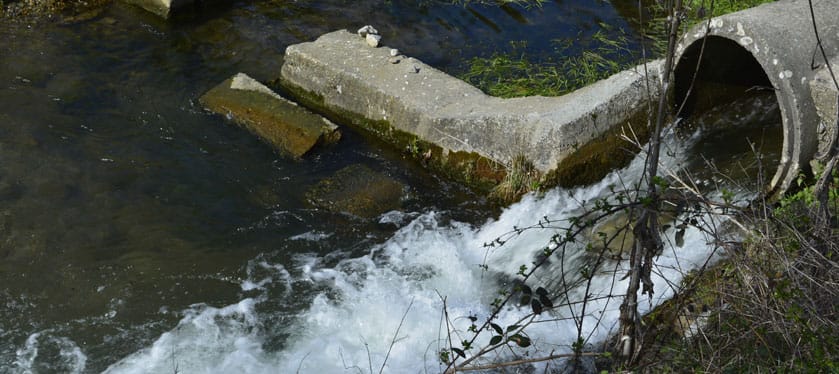Stormwater in Pennsylvania – Giving is Better Than Receiving

Quick Summary
Stormwater disputes can create significant challenges for landowners in Pennsylvania, especially as rain and runoff increase during development or redevelopment projects. Under the “common enemy rule,” upper landowners have a right to discharge water onto lower properties, but this right has limits. Liability arises when water is collected, concentrated, or altered unnaturally, leading to increased flow or damage to a neighbor’s adjoining property.
What Are Stormwater Regulations?
With the Pennsylvania Stormwater Management Act and municipal regulations in play, navigating stormwater issues requires a clear understanding of legal obligations and rights. Whether you’re dealing with flooding, drainage disputes, or development-related runoff, legal counsel can help protect your property and interests. Contact Eric B. Smith, Esquire to address stormwater challenges and find practical solutions.
As Springtime arrives, along with warmth, al fresco dining, and as the turn from gray to green begins, so too arrives rain and its companion, stormwater. Understanding the essentials of stormwater is a “must know” for any land owner.*
The Common Enemy Rule – An Upper Landowner’s Right to Discharge
Pennsylvania common law has long recognized the right of an upper landowner to discharge onto the land of another surface waters flowing on or over the owner’s land through a natural water course. Since the mid-1800s, the Pennsylvania Supreme Court has held that, essentially, that because water flows downward, the owner of the upper land has an easement over the land of the lower owner to discharge all water that may flow or fall upon the upper lot.
But, the right of an upper landowner’s to discharge water on the lower land of his neighbor is not unlimited. Generally, this right to discharge is only for the water’s natural courses, quantities, and concentrations. Of course, the lower landowner must accept the water lawfully discharged by the upper landowner. This concept is broadly known as the “common enemy rule.”
Exceptions to Right of Discharge
The right to discharge is not unlimited. To establish liability for unlawful discharge, a plaintiff need only show that a landowner collected and/or concentrated surface water from its natural channel through an artificial medium and discharged the water onto the plaintiff’s property in an increased volume or force, however, slight.
An upper landowner’s right of flowage is generally subject to two exceptions.
First, the upper landowner may not “alter the natural flow” through concentration, even if the water ultimately discharged is no greater in quantity. As an example, an upper landowner’s construction of a series of pipes or ditches collecting quantities of water to a point of discharge upon the lower landowner’s land exceeds the rights of the upper landowner.
Second, the upper landowner may not “unreasonably or unnecessarily” change the quality or quantity of the water discharged on the lower land. An example here, land development that redirects, concentrates, or changes the water flowing onto lower land could cause liability to the upper landowner. This potential liability is of course balanced by reasonable development of the land in accordance with municipal and state regulations.
To impose liability on an upper landowner for the effects of surface water runoff on a lower-lying property, the lower landowner must generally show one of these two exceptions applies—that the upper landowner either “diverted the water from its natural channel by artificial means, or . . . unreasonably or unnecessarily increased the quantity (or changed the quality) of water discharged upon his neighbor.”
Limited Exceptions to Liability
Even where it is proven that the upper landowner has changed the land such that a change of the natural flow of the water occurs, or concentrates the water at a particular point, or by increasing the water’s volume, the upper landowner may avoid liability if it is shown that the use that inflicted the damage was “natural, proper, and free from negligence, and the damage unavoidable.”
It is a long-recognized principle that all landowners have a right to the use and enjoyment of their own property, and if in exercising that right, without negligence, an unavoidable loss occurs to the lower land owner, then, the law will treat this as a “loss without injury.” For this liability exception to apply, the upper landowner must show that “the damage was necessary and unavoidable” and that it could not be prevented by reasonable care.
Pennsylvania stormwater Management Act
Many municipalities have adopted stormwater ordinances or other applicable regulations. Additionally, the Commonwealth of Pennsylvania enacted the Stormwater Management Act (“Act”). The Act does not change or supersede the common law rights, obligations and remedies as between an upper and lower land owner, nor is the common enemy rule impacted. Pertinent to a general understanding of stormwater law in Pennsylvania, as between landowners, the Act provides:
Any landowner and any person engaged in the alteration or development of land which may affect stormwater runoff characteristics shall implement such measures consistent with the provisions of the applicable watershed stormwater plan as are reasonably necessary to prevent injury to health, safety or other property. Such measures shall include such actions as are required:
(1) to assure that the maximum rate of stormwater runoff is no greater after development than prior to development activities; or
(2) to manage the quantity, velocity and direction of resulting stormwater runoff in a manner which otherwise adequately protects health and property from possible injury.
Stormwater Management Act, 32 P.S. § 680.13. However, subsequent case law has held that neither landowners nor state and local governmental entities could be held liable under the Act for flooding incidents impacting other property owners that occurred before the county adopted its watershed stormwater plan because a prerequisite for a violation of the Act was the existence of such a plan. See Lincoln Investors, L.P. v. King, 152 A.3d 382 (Pa. Commw. Ct. 2016).
Certain political subdivisions may also be liable under the Act.
Conclusion
Stormwater remains the “common enemy” among landowners. As land development overtakes natural open space, and suburban sprawl and redevelopment changes the natural, or existing, flow, course and concentration of water, stormwater rights, remedies and regulation have become increasingly utilized.
Further, with what appears to be an increase in drastic rain and storm events, stormwater run-off is amplified and so are its effects and potential damage. Re-configured roadways and private drives, railroads, damaged creeks and detention basins, have all been the subject of litigation, in addition to claims arising simply from the development of raw land, or the re-development of an existing site with unplanned, or under-planned, for stormwater results.
Flooding the land of another with increased flow, or collected, re-channeled water, is prohibited; likewise, also prohibited is a lower land owner damming, or blocking, acceptance of a permitted flow of water from an upper land owner.
Stormwater Issues Require Legal Expertise to Navigate Effectively.
Whether you’re facing property flooding, runoff disputes from neighboring developments, or compliance with Pennsylvania’s stormwater regulations, Eric B. Smith, Esquire, and his experienced legal team are ready to protect your rights and property. With a deep understanding of stormwater law and years of proven success, Mr. Smith can provide the guidance you need to resolve disputes and achieve favorable outcomes.
Recognized by Super Lawyers and Best Attorneys for his exceptional work, Mr. Smith brings a reputation for excellence to every case. As a past President of the Montgomery Bar Association (2017), he is a respected leader in the legal community, known for his dedication to his clients and his craft.
Ready to take the next step? Contact Eric B. Smith, Esquire, today to discuss your case and explore your legal options. Learn more about Mr. Smith here.
*This article does not address the breach, alteration, or enforcement of express or implied stormwater easements.
Frequently Related Questions
What legal options do I have if my property floods due to a neighbor’s construction project?
If a neighbor’s construction project alters the natural water flow, concentrates runoff, or increases water discharge onto your property, you may have a claim for damages or injunctive relief. We can evaluate your case and help protect your property.
Can I be held liable for stormwater runoff if I comply with local development regulations?
Even if you comply with municipal and state regulations, you could still face liability if your actions unreasonably alter the natural flow or concentration of water, causing harm to neighboring properties. We can help assess and mitigate risks.
May my neighbor redirect his stormwater onto my property?
No, under no circumstance may your neighbor redirect stormwater onto your property.
May my neighbor build a dam or otherwise block the flow of stormwater off of my property onto her property?
No, just as you cannot concentrate and redirect stormwater onto your neighbor’s property, your neighbor cannot prevent your stormwater from its natural flow.
My neighbor recently regraded his entire lot so that his stormwater now flows onto my property, what can I do?
Your neighbor is not permitted to do that. He may not alter the natural flow or direction of stormwater and can be forced to correct the grading and liable for damages.
The Township approved tree removal and grading on my neighbor’s lot causing stormwater to be concentrated and directed onto my property, is my neighbor protected because the Township permitted it?
No. Even if the Township permitted and approved the plans and work, your neighbor may not cause stormwater to be concentrated and directed onto your property.
Updated: December 28, 2024






